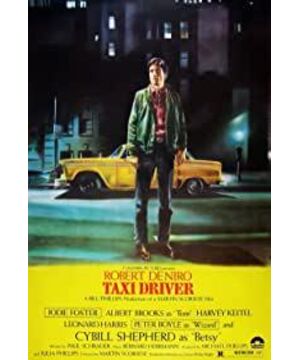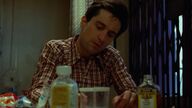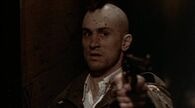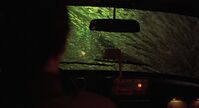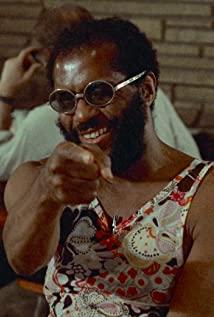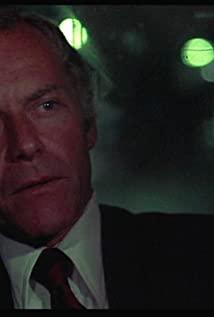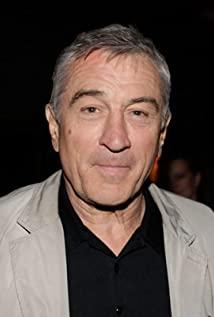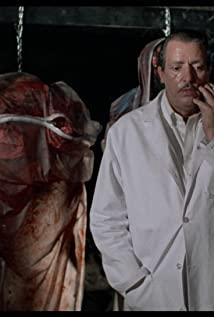Author: Pauline Kael (The New Yorker)
Translator: csh
The translation was first published in "Iris"
"Taxi Driver" is a crazy story about outsiders in New York-a man cannot find any entry point into human society. Martin Scorsese's new work is derived from Paul Schrader's script. Its protagonist Travis Bickel (Robert De Niro) cannot find the "life" he wants. He is a former Marine from the Midwestern United States. He got a job driving a taxi at night because he couldn't sleep anyway. At the same time, he was surrounded by naked nightlife-prostitutes, pimps, casual workers. Schrader grew up in Michigan, was influenced by the Reformed Church, and was a passionate Calvinist (he didn't watch a movie until the age of seventeen). He created a passive ascetic character, this abstinence is not because of active choice, but because of fear. And Scorsese's moody mood, as well as his preference for inferior sensational works of the 1940s, made him the most suitable director to present this American underground resident. Travis wanted to comply with certain things, but he couldn't find a suitable group model. So he sat down and drove the taxi in a state of fatigue and aphasia. He hated New York with a resentment from the "Bible", because it exuded a hellish stench, and its filth and filth bothered him. He managed to date Bessie (played by Spil Sheppard), a political activist with blond hair and white clothes. She is a symbol of purity to him, but he is so isolated from the world , So that she inadvertently offended her, and she will no longer have any connection with him. When he was confused to ask Witchard (Peter Boyle), an older taxi driver, for advice, and said that his inner pressure was increasing, Witchard didn't know what he was talking about. Travis felt discomfort due to loneliness and depression, and then, like a commando preparing to launch an attack, he purified his body and began to engage in killing training. "Taxi Driver" is a movie that exudes high temperatures. It is a rougher and more sensational version of "Notes on the Basement", and the hatred of the protagonist is always with us during the viewing process.
This film is more cruel than Scorsese’s capricious and metaphorical "Poor Streets". "Taxi Driver" presents a never-ending activity: Travis wants to find a way of relief. This is a story that takes place between two characters-Travis vs. New York. As Scorsese showed, this city will never let you out. In the atmosphere that is set off by artificial lighting, there is no compassion and no mercy. The red light of neon lights, the steam wafting from the street and the dilapidated texture, like Travis, also affect you in front of the screen. He is extremely sick, but he is also the only one willing to save the twelve-and-a-half-year-old girl, her name is Iris (Judy Foster). He used the argument that she belongs to her family and she should stay in school too-this value of safety originated from his past, but for him, it is no longer useful in the present. Travis lacks a certain adaptation mechanism in his body, and the details of his life have not been filled-all he has is a strict religious background and the scars on his back, which proves that he has been injured in battle. The urban world is constantly pressing on him, but at the same time, it is still far away from him-Travis is always very dissatisfied, because he does not have a strong sense of presence here. We perceive this city like him. It is so dirty and disgusting. This film makes us realize his sense of alienation.
Scorsese may be a natural expressionist. He comes from a Sicilian-American family and spent a bedridden childhood because of asthma, which allowed him to watch a series of exciting movies. From a physical and spiritual level, he is a "speed devil" and a dervish. Even in "Once the Sea is Difficult for Water", he has found a way to present a state of anxiety and hectic. However, Scorsese is also one of the directors who pays the most attention to physicality-sports fascinates him-but this is not reflected in "Once Upon A Time". And this new work gave him an opportunity to present the city in a complete and expressionistic way. In "Poor Streets", he did not do this, because although the film It was shot in New York, but its production cost was very low. It was mainly shot in southern California, and the shooting time in New York was only seven days. Scorsese's expressionism is different from the exaggerated setting of the German director. He used documentary-style exterior scenes, but he pushed that discordant element to the extreme. Photographer Michael Chapman also injected a corrupt and rich berry texture into the scene of the city streets. The New York in Scorsese's film is a big city full of tremors, in which he invested his imagination-but he also showed its decline immediately. This New York is a sexy enemy. The steam on the streets is like a ghost, the erotic theater is like a morgue, and even the traffic jam scene is creepy. Moreover, this hell is always moving.
No movie can show the indifference of the city so strongly. First, it will give birth to a terrifying pleasure, but in the end only horror will remain. When Travis tried to date Bessie, he looked very attractive. We can realize why she is attracted. They are talking across a huge gap, but there is still a connection between them (although all the wires are connected together). In such a scene, there is something unusual: an educated, socially conscious woman is dating a clumsy, lost soul, who uses the oldest kind that can be found in the book. He’s a lonely person. He told her that he knew she was a lonely person. Travis did think so, and the creepy comic in this scene was that he was so sure of everything he said-because his own life was completely empty. Throughout the film, when Travis talks to other people, his position is completely different from them. He is so isolated from the world, so enclosed in his own world. He participated in so few conversations that slang words like "drive a night car" would be ignored directly by him-this kind of spoken language was very strange to him. His response is sometimes so blocked, it makes us feel as if he is exhausted. But at other moments, he has the speed of a beast. The man was burning in pain, and his red, swollen eyes became the focus of the film's composition. Robert De Niro exists in almost any frame: his thin face, sometimes as handsome as Robert Taylor, and sometimes as smart as Cagney-he is not just watching For those who talked with him, he was also examining them. Like Travis, De Niro doesn't actually have the humility of the villagers like Vito Corleone in "The Godfather 2". Vito can control himself and manage his violent activities: he is a leader. But Travis's danger is different, his danger is cumulative. On his nervous face, there was a hillbilly smile, and he almost looked like a fool. He would sit in his room, staring blankly at the young faces with bright eyes on the TV. His growing desire for revenge was present in his numb state. However, there is also an implicit horror in this film, that is, his road to revenge is so smooth. The anonymity of urban space has absorbed another invisible person, who can be a person or an army.
As a director, Scorsese would occasionally show off his overflowing talent as he pleases. Sometimes, a certain lens draws our attention to itself because it has no obvious purpose. The audience can ignore the close-up shot of the street musician, but when Travis was chatting with Bessie on a public phone in an office building, the camera left him and moved to the empty corridor. This is an Antonioni-style shifting scene. Bernard Herman’s soundtrack is a much bigger problem. The composer completed the recording the day before his death-December 23rd-but his music did not get better because of it. , So this can be said to be a double regret. The reason why Scorsese chose Herman is obvious: his specialty is to express psychological confusion through uncoordinated and tense music. But in "Taxi Driver", desire and violence are in a repressed state, and the psychological tension is already very strong. This film does not need those dangerous percussions, snake-like ringtones and flowing water-like scales. Variety. These music-level boosting effects belong to the kind of rampage thriller, and "Taxi Driver" has obviously surpassed those works. Scorsese got some wealth from his asthma: He knew how to make us experience that kind of suffocating horror.
Some actors may be seen as empty containers, they are simply filled with their roles, but this is not the case with De Niro. He took another path. He took advantage of his emptiness-he was drowning in his own chaotic state. Only Marlon Brando has shown the same addiction, and De Niro's performance in this film has the same intensity as Brando's performance in "The Last Tango in Paris". The film itself also has a certain erotic atmosphere. There is actually no sex in the film, but this state of asexuality can be as disturbing as sex itself. This is what it means: the absence of sex creates a certain kind of repressed, tense energy and emotions, and only overflowing blood can dispel this state. We recognized Travis’ needs personally. He needed an instinctive explosion. This explosion itself also has a perfect quality, which makes "Taxi Driver" one of the few real modern horrors. One of the pieces.
What those lonely seldom realize is that anyone who goes to the cinema to watch a movie will identify with the perpetrator, even if these characters commit the most terrifying crime. And these audiences will only be satisfied when they see a very powerful orgasm. Norman Mailer pointed out in his article "The White Negro" that when a killer avenges the structure that oppresses him, the explosive violence will have a positive effect on him. The most shocking part of "Taxi Driver" is that it takes advantage of this element and puts it in the center of the audience's attention. Violence is the only way for Travis to express himself. He cannot overcome the obstacles that prevent him from observing and perceiving. When he broke out, it was the only way he could express his existence to this city. Moreover, given his ascetic loneliness, this is the only orgasm he can achieve.
The violence in this movie is so threatening precisely because it is a "laxative" for Travis. According to my guess, some people may be angry with this film, and they will say that this film is advocating a solution that is to view violence as a solution to frustration. But what needs to be admitted is that when a mentally ill person starts to boil and cannot control himself, presenting this state and process is different from defending his outbreak. The standpoint of this film is not a moral trial of what Travis did. On the contrary, it is absorbing us into his vortex, allowing us to understand the quiet boys and realize their mental process of going crazy. When we saw that Travis was so peaceful at the end, we seemed to be slapped hard. He had eliminated that anger from his system-at least at that moment-and then he returned to work and continued to pick up passengers in front of the St. Regis Hotel. This is not because he is cured, but because the city is crazier than him.
View more about Taxi Driver reviews


